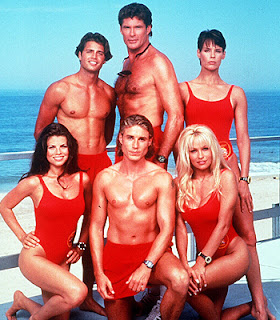[Time-sinks] Lifesaving
It's time for part 2 of my series on the hobbies and activities that suck up all of my time! Today I'm going to talk about possibly the second biggest (sometimes even the biggest) time-sink: lifesaving. Warning - this post will be a long one!
(What most people think of when I mention lifesaving. It's not like Baywatch all the time, honest. Credit: Australian Daily Telegraph)
I suppose an obvious starting point would be "What's the difference between a lifeguard and a lifesaver?" The answer is actually a little bit more complex than you might expect. A lifeguard is a professional, works at a swimming pool, and has a responsibility to prevent injuries from occurring. A lifesaver is a trained amateur (although qualifications are very important to prove that you're trained), will primarily will work to treat injuries that have already happened, and stop them getting worse, and has no responsibility other than their own morals and sense of duty. This last point is the really important one. Lifesavers are under no obligation to help people. In reality, every single lifesaver I know would absolutely help out in an emergency situation, but that's because they're all lovely people, not because they have to.
There are two mains sides to lifesaving: awards, and sport. In the UK the former are controlled by the RLSS. The awards system is called "Survive and Save", and consists of four strands (Medallion, Sport, Beach and Stillwater), each of which has three levels (Bronze, Silver and Gold). The highest award that the RLSS gives out is the Distinction, which requires you to hold Gold level awards in three of the strands within a 12 month period. Since each award is only valid for 12 months, this is harder than it sounds! The awards side of lifesaving is what most people think of, or have experienced. We train in methods of saving people from drowning and in first aid, and learn the theory of water safety. Yes, we do quite often swim around swimming pools in our clothes, but we tend to use real people to practice on rather than bricks.
(Poster for the new Survive & Save awards from the RLSS. Credit: RLSS)
Lifesaving sport is very different, and deserves a post of its own really. But I'll give a brief overview here. Essentially there are two strands to lifesaving sport - speed lifesaving, and SERC lifesaving. Speed lifesaving involves lots of strange swimming events, many of which involve fins, torpedo buoys, orange sinking manikins, or some combination of all three. The longest events are only 200m long, which doesn't sound much to people trained in 'proper' swimming events, but they're hard work and in some cases involve a lot of skill. There are 7 individual events and 4 relay events that usually make up a speed lifesaving competition, but to avoid making this post any longer I'll go over them when I talk about the BULSCA championships in a later post.
Simulated Emergency Response Competition (SERC) lifesaving involves a team of 4, with a designated captain. There are normally 5 events in such a competition: 2 SERCs, one on dry land and one in the water, and 3 relays. Again, I'll go into more details in a future post. But the SERCs deserve a bit of explanation. Essentially, the team is given a briefing as to where they are, what they're doing, and what they hear or see before the SERC starts. They then enter the SERC area to be confronted by a range of casualties with simulated injuries, and have two minutes to deal with the situation as best they can. Points are awarded based on casualty identification, assessment and prioritisation, quality of treatment, speed of summoning help, teamwork, captaincy etc Scenarios can range from the very simple to the overly complicated, passing through the highly imaginative along the way. I've dealt with scenarios in simulated caves, real double-decker buses, and at beaches in my time as a competitor! It was these SERCs that really caught my interest when I began getting involved in lifesaving sport, and it's the SERCs that have kept me involved and kept me coming back for more. Don't get me wrong, I love the speeds and the relays. I'm too much of a competitive bastard not to enjoy swimming against other people. But it's the mental challenge of the SERCs that really stimulates an excites me.
(An example of a lifesaving SERC. This is the St Andrews A team from the 2011 Bristol University competition, featuring yours truly. Credit: Teddy Woodhouse)
As far as my history with lifesaving goes, I qualified as a lifeguard when I was 16 (the youngest that you're legally allowed to). My intention, driven I must admit by my mum, was to get a summer job working at the local swimming pool. For a variety of reasons, but mainly the fact that I couldn't really be bothered, this never happened.
I then went off to the University of Warwick, where I noticed that they had a lifesaving club. I decided to join in order to earn some training hours towards retaking my NPLQ course. I went along to their first few training sessions, got to know some of them, tried out some of the lifesaving sport events, and was 'persuaded' to go along to the varsity competition that they run every year with the University of Birmingham. That was when I was lost, even I didn't realise it at the time. I enjoyed myself, although the team I was on didn't do that well, and decided that I stick with the club and try more competitions in the future.
As I went through my 4 year undergraduate course I gradually got more and more involved, ramping up the number of competitions that I went to until I was going to all of them in my 4th year. I won a gold medal in my second year, was a member of the A-team in my 3rd year, and captained the A-team in my 4th year, winning several medals including a bronze medal at the student championships. Me, captaining the A-team of a sports club! And winning things! I'd never imagined that that would ever happen.
(Winning Gold at the Birmingham University competition in 2007. One of the high points of my sporting career. Credit: David Brown)
In amongst all of the lifesaving sport I took a range of awards as well; I re-qualified as a lifeguard, actually used the qualification one summer (it turns out that lifeguarding is really dull), earned the Bronze medallion, Award of Merit, Lifesupport and Lifesupport 3 awards from the RLSS, and passed the First Aid at Work course as well.
Then I graduated. I'd already decided to study for a PhD, and moved up to St Andrews to do so. I knew in advance that they had a lifesaving club (it was something I checked out when looking for possible places to study, and I'd be lying if I said that it didn't play a part in my decision), and there was never any doubt that I'd join.
(A close race at the BULSCA Student Championships 2011. Credit: Ella Hunt)
That was 2.5 years ago. Since then I've been Awards Coordinator (and vice-Captain) and Competitions Coordinator (+vice-Captain again) of the club, have been captain of the A-team for the last 3 seasons, won 4 bronze medals, 2 silver medals and a silver at the championships, been top of the BULSCA league for half a season, eventually finishing 3rd, and seen the competitive side of the club grow from non-existent to a consistent sight at competition, and in the top 10 on the results sheet. But possibly my proudest achievement was organising and running the club's own competition - more on that, and other thoughts on the St Andrews Seacows, in a future blog post.






Comments
Post a Comment